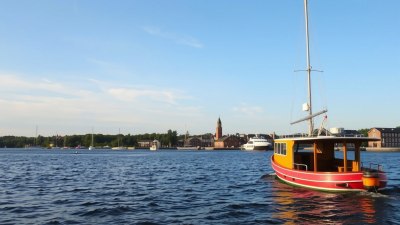Budget-Friendly Tips for Bike Travel Across Europe
Discover affordable biking travel tips for exploring Europe without breaking the bank.

Image created with Flux Schnell
Traveling across Europe by bike can be both an exhilarating and cost-effective way to explore the diverse cultures and landscapes of the continent. With the right planning and budgeting strategies, biking can be an enjoyable experience without putting a strain on your finances. In this guide, we will explore some budget-friendly tips for bike travel across Europe, ensuring you get the most out of your journey while keeping costs low.
1. Plan Your Route Wisely
Before embarking on your biking adventure, take the time to research your route. Europe offers an extensive network of cycling paths, many of which are scenic and safe for cyclists. Utilize online maps and cycling apps to identify the best routes. Avoiding major highways or busy urban areas can enhance your experience and save you the cost of potential transportation alternatives. Additionally, when choosing your route, consider the distance you want to cover each day, factoring in your fitness level and how much time you want to spend cycling versus exploring.
2. Choose Off-Peak Seasons
Traveling during the off-peak seasons can significantly reduce your travel costs. During the less busy months, accommodations and attractions often have reduced rates. Also, popular tourist routes tend to be less crowded, allowing for a more peaceful biking experience. Late spring and early autumn are excellent times to travel, with mild weather and fewer tourists, providing an overall more enjoyable trip.
3. Budget Accommodations
Accommodations can eat up a large chunk of your budget if you're not careful. Instead of opting for hotels, look for budget-friendly options such as hostels, guesthouses, or campsites along your route. Sites like Hostelworld and Booking.com offer affordable lodging options. Additionally, consider staying with locals or using platforms like Couchsurfing for free accommodation experiences. If you’re camping, invest in a good quality tent and research campsites or wild camping laws in the countries you’ll visit.
4. Pack Light
Bringing only the essentials can help keep your travel costs down. A lighter bike is easier to manage, and packing minimally can save you the fees associated with checking extra luggage on trains or buses. Focus on bringing versatile clothing that can be layered and that dries quickly. Also, consider multifunctional gear, such as a bike that can also be used for commuting or leisurely rides, so you don’t need to rent additional bikes at each destination.
5. Eat Smart
Dining out in Europe can be expensive, especially in tourist hotspots. To save money on food, try shopping at local markets and grocery stores to prepare your meals. Many European cities have fresh produce markets that offer affordable and delicious local ingredients. If you do dine out, seek out local bistros or cafés away from the main tourist attractions, as prices are often significantly lower. Also, consider lunch specials, which are more budget-friendly than dinner menus. Investing in a portable stove or cooking equipment can also enhance your meals while keeping costs down.
6. Use Public Transport When Necessary
While biking is a wonderful way to see Europe, there may be times when public transport can help you save time or avoid difficult terrain. Research how to transport your bike on trains or buses; many European countries have bike-friendly transport policies that allow you to take your bike along at a reasonable cost. Invest in a rail pass if you plan to travel between numerous cities, as it can offer considerable savings. Always check local regulations regarding bike transport to avoid surprises.
7. Take Advantage of Free Attractions
Europe is rich in history and culture, many of which can be enjoyed without spending a dime. Investigate free or low-cost attractions in each city you visit. Many museums and galleries offer free admission on specific days or reduced rates during certain hours. Parks, walking tours, and historical sites can provide an enriching experience without requiring a hefty entrance fee. Walking or biking tours run by locals are often available for a donation—consider this option for authentic insights into your destinations.
8. Engage with Local Cyclists
Connecting with fellow cyclists can offer invaluable tips about budget travel in the area. Seek out local cycling groups on social media platforms or forums such as Reddit or Facebook. Engaging with locals not only enhances your experience through shared wisdom but may also offer opportunities for networking, such as finding a place to stay or learning about lesser-known attractions.
9. Look for Cycling Events
Check whether your travel dates coincide with cycling events, competitions, or festivals. Participating in local cycling events can provide meaningful interactions with like-minded individuals and create a sense of community. Plus, many of these festivals offer free or cheap activities, workshops, and entertainment. It’s a fantastic way to dive deeper into the biking culture of the region while connecting with potential travel companions.
10. Use Discounts
Consider looking for discounts or travel passes that apply to cyclists or tourists. Depending on the regions you are visiting, various city cards offer discounts on attractions, public transport, and other activities. These discounts can significantly lower your travel costs. Additionally, always ask about student discounts or promotional offers that might apply to your situation.
11. Tune-Up Before You Go
Before embarking on your bike tour, ensure that your bike is in good working order. A well-maintained bike can prevent unexpected repair costs on the road. Take it to a local bike shop for a tune-up and inspect all the components yourself. Ensure brakes, gears, and tires are functioning correctly, and don’t forget to pack essential tools for minor repairs while traveling. The investment in maintenance can save you money and stress during your travels.
12. Stay Hydrated
While this may not seem directly related to budgeting, keeping hydrated can reduce unnecessary expenses. Make it a habit to fill up your water bottle instead of purchasing sugary drinks when you’re out. Most European cities have drinking fountains, especially in parks and public squares, where you can refill. Staying hydrated increases your energy levels, reducing the temptation to stop for snacks or sugary beverages along the route.
13. Learn Basic Language Skills
Knowing a few phrases in the local language can go a long way in Europe. Attempting to communicate with locals not only enriches your travel experience but can also lead to discounts in shops if you build rapport. Simple phrases like “hello,” “thank you,” and “please” can endear you to shop owners or restaurateurs, who may offer you special deals or recommendations. Learning the language can sometimes open doors to exclusive local knowledge and experiences that aren't advertised.
14. Document Your Journey
Keeping a travel journal or blog not only allows you to document your adventures but can also serve as a resource for future travels. Review your expenditures, experiences, and the lessons learned while biking across Europe. This documentation may aid in planning future trips and offer insights into budget-friendly strategies you discovered along the way. Plus, sharing your experiences may even inspire others to take on similar adventures.
15. Embrace Flexibility
Your travel plans should remain flexible to capitalize on deals as they come up. If you find yourself in a particular location longer than anticipated or come across a suddenly discounted activity, embrace the shifts. A flexible schedule can also help reduce costs, allowing you to capitalize on cheap accommodation or side trips that weren’t originally in your itinerary. Flexibility can lead to spontaneous adventures that add richness to your overall experience.
Biking across Europe can offer a fulfilling and budget-friendly way to experience the continent’s stunning landscapes and vibrant cultures. By using these budget-friendly tips, you can make the most of your bike travel while minimizing expenses. With careful planning, flexibility, and resourcefulness, your biking trip through Europe can be an unforgettable adventure that is both enjoyable and financially smart. So, gear up, hit the pedals, and embrace the open road!











